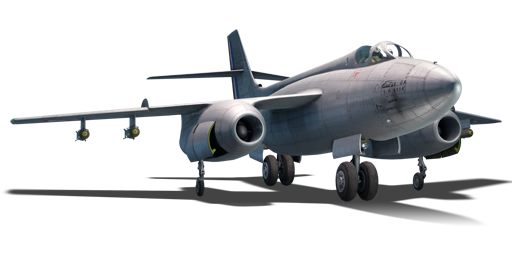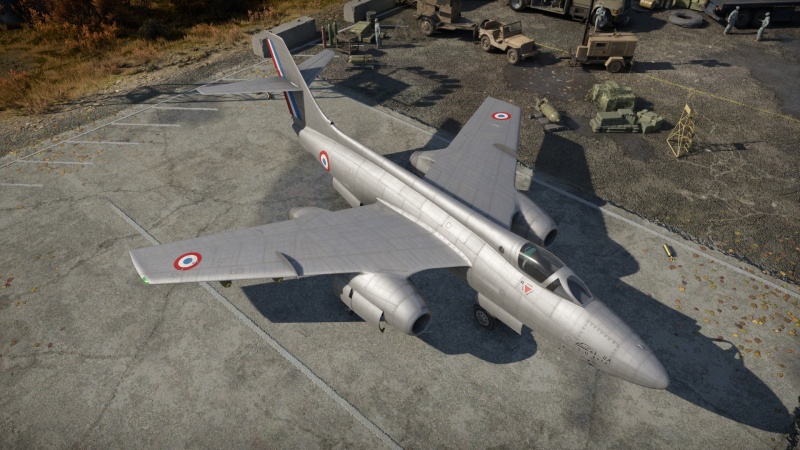S.O.4050 Vautour IIA
| This page is about the French jet bomber S.O.4050 Vautour IIA. For other versions, see Vautour (Family). |
Contents
Description
The S.O.4050 Vautour IIA is a rank French jet bomber with a battle rating of (AB), (RB), and (SB). It was introduced in Update 1.73 "Vive la France".
General info
Flight performance
The S.O.4050 Vautour IIA is the fastest accelerating, climbing and diving subsonic plane in the entire game. The acceleration of the aircraft is ridiculous, coupled with the insane climb rate and diving capabilities makes the S.O.4050 IIA a very powerful aircraft.
| Characteristics | Max Speed (km/h at 0 m - sea level) |
Max altitude (metres) |
Turn time (seconds) |
Rate of climb (metres/second) |
Take-off run (metres) | |||
|---|---|---|---|---|---|---|---|---|
| AB | RB | AB | RB | AB | RB | |||
| Stock | 1,093 | 1,091 | 32.6 | 33.2 | 43.0 | 41.1 | 900 | |
| Upgraded | 1,106 | 1,100 | 31.4 | 32.0 | 62.7 | 52.0 | ||
Details
| Features | |||||
|---|---|---|---|---|---|
| Combat flaps | Take-off flaps | Landing flaps | Air brakes | Arrestor gear | Drogue chute |
| ✓ | ✓ | ✓ | ✓ | X | ✓ |
| Limits | ||||||
|---|---|---|---|---|---|---|
| Wings (km/h) | Gear (km/h) | Flaps (km/h) | Max Static G | |||
| Combat | Take-off | Landing | + | - | ||
| 584 | 564 | 463 | ~7 | ~3 | ||
| Optimal velocities (km/h) | |||
|---|---|---|---|
| Ailerons | Rudder | Elevators | Radiator |
| < 480 | < 620 | < 590 | N/A |
Engine performance
| Engine | Aircraft mass | |||||
|---|---|---|---|---|---|---|
| Engine name | Number | Empty mass | Wing loading (full fuel) | |||
| SNECMA Atar 101E3 | 2 | 11,000 kg | 316 kg/m2 | |||
| Engine characteristics | Mass with fuel (no weapons load) | Max Takeoff Weight | ||||
| Weight (each) | Type | 8m fuel | 20m fuel | 27m fuel | ||
| 950 kg | Axial-flow turbojet | 11,974 kg | 13,388 kg | 14,213 kg | 21,000 kg | |
| Maximum engine thrust @ 0 m (RB / SB) | Thrust to weight ratio @ 0 m (100%) | |||||
| Condition | 100% | WEP | 8m fuel | 20m fuel | 27m fuel | MTOW |
| Stationary | 3,293 kgf | N/A | 0.55 | 0.49 | 0.46 | 0.31 |
| Optimal | 3,595 kgf (1,100 km/h) |
N/A | 0.60 | 0.54 | 0.51 | 0.34 |
Survivability and armour
- 50 mm Bulletproof glass in front of pilot.
- 13.5 mm Steel plate behind the pilot's head.
- 6 + 13.5 mm Steel plate in front of cockpit.
- 3 mm Steel shell surrounding the cockpit in the fuselage. Does not extend to cockpit front.
- 2 mm Steel plate behind the fuel cells.
- 2 mm Steel plate in the tail.
Modifications and economy
Armaments
Offensive armament
The S.O.4050 Vautour IIA is armed with:
- 4 x 30 mm DEFA 551 cannons, nose-mounted (100 rpg = 400 total)
The four machine guns are arranged in bundles of two mounted in the nose of the fuselage. Each is armed with the same amount of ammunition, which means that all guns will fire together until empty.
Suspended armament
The S.O.4050 Vautour IIA can be outfitted with the following ordnance:
- 10 x 100/50 kg G.P. bombs (1,000 kg total)
- 10 x 250/50 kg G.P. bombs (2,500 kg total)
- 10 x 360/50 kg G.P. bombs (3,600 kg total)
- 6 x 500/50 kg G.P. bombs (3,000 kg total)
- 24 x T10 140 rockets
- 24 x T10 151 rockets
- 76 x SNEB type 23 rockets
- 24 x T10 140 rockets + 6 x 100/50 kg G.P. bombs (600 kg total)
- 24 x T10 140 rockets + 6 x 250/50 kg G.P. bombs (1,500 kg total)
- 24 x T10 140 rockets + 6 x 360/50 kg G.P. bombs (2,160 kg total)
- 24 x T10 140 rockets + 2 x 500/50 kg G.P. bombs (1,000 kg total)
- 24 x T10 151 rockets + 6 x 100/50 kg G.P. bombs (600 kg total)
- 24 x T10 151 rockets + 6 x 250/50 kg G.P. bombs (1,500 kg total)
- 24 x T10 151 rockets + 6 x 360/50 kg G.P. bombs (2,160 kg total)
- 24 x T10 151 rockets + 2 x 500/50 kg G.P. bombs (1,000 kg total)
- 76 x SNEB type 23 rockets + 6 x 100/50 kg G.P. bombs (600 kg total)
- 76 x SNEB type 23 rockets + 6 x 250/50 kg G.P. bombs (1,500 kg total)
- 76 x SNEB type 23 rockets + 6 x 360/50 kg G.P. bombs (2,160 kg total)
- 76 x SNEB type 23 rockets + 2 x 500/50 kg G.P. bombs (1,000 kg total)
Usage in battles
The S.O.4050 Vautour IIA should be used like the Hunter, but more aggressively. Always load 8 minutes of fuel, use the bomber spawn to spawn at 3,000 meters, rush to a base, drop your bombs then rush to the enemy airfield to catch enemies off-guard. Besides catching enemies off-guard, the Vautour IIA can cause the enemy team to panic by rushing - when enemy players see a Vautour going faster than 1,000 km/h and they're a lot slower - they tend to panic, causing them to scatter around to find space in order to gain speed which could possibly ruin teamwork. Do NOT turn. The Vautour is very bad at turning and rolling, it should be used as an exclusive boom and zoomer - like the Hunter. Gain speed, engage, zoom up, loop around, dive, rinse and repeat. The Vautour has excellent energy retention characteristics.
In a downtier, jets such as the CL-13, MiG-15bis, MiG-17 etc should be your main concern. They turn and roll better than the SO.4050 does. While you can outrun the MiG-15s at sea level, you cannot run away from the MiG-17 and the CL-13 as their top speeds are higher (MiG-17: 1,121 km/h, CL-13: 1,114 km/h). Despite that fact, the Vautour outclasses them in climb rate, energy retention and acceleration. The Me 163 B and G.91 are also no match for the plane's speed.
However, with the advent of air-to-air missiles, the Vautour's lack of manoeuvrability becomes a crucial weakspot. The maximum overload of +6G is often insufficient to evade missiles, especially when attempting to do so at high speed. As such, the Vautour is an incredibly easy for even an AIM-9B Sidewinder. In addition, the introduction of powerful, high-climbing jets like the AV-8C and Harrier GR.1, mean that it is now impossible to exploit the Vautour's climb rate to your advantage. These factors coincide to make the Vautour hard to play when uptiered, and as such, a more passive playstyle is recommended. When uptiered, you can either attempt to rush and force head-ons with enemy players, or you can wait for the enemy team to engage friendly fighters before bombing the bases.
Pros and cons
Pros:
- Decent payload options, enough to destroy all 3 minibases (4 x 750 on the first base, 3 x 750 on the other two).
- Insane acceleration.
- High top speed, outruns many aircraft at its battle rating.
- Climbs exceptionally well without ordnance.
- Energy retention is great.
- Bomber spawn (3,000 - 3,500 meters).
- Extremely versatile (can be used in a variety of roles).
- Armoured cockpit, easier to survive head-on engagements.
Cons:
- Ammo consumption is too high to engage multiple targets.
- Compresses at high speed (similar to that of the MiG-15s' and MiG-17's infamous compression).
- No bomb sight unlike the earlier S.O.4050 Vautour IIB.
- Massive penalties in flight performance when carrying ordnance.
- Bad manoeuvrability, making it hard to dodge missiles.
- Roll rate is unimpressive.
- Fragile engines; a hit to an engine will massively decrease top speed.
- Relies heavily on team support.
- Massive target.
- Wings tend to rip with payload on the wings above 850 km/h, or when pulling high-G manoeuvres.
History
In total 140 of the versatile and powerful Vautour aircraft were built by France between 1956 and 1959. The Vautour II-A was the ground attack variant; the II-B the bomber; and the II-N an all-weather interceptor. The first two variants saw greater service with the Israelis, whereas the interceptor was used by the French. All variants were still in use into the 1970s.
The II-N prototype, with two crew, had made its first flight in October, 1952, followed by the single-seat II-A in December, 1953. After nine prototypes, the French made an initial order for 440 aircraft, including 300 II-As. However, only 30 of the II-A would be completed, with the first entering service in 1956. In 1960, all II-A and the 40 II-B (the two-seater bomber model) that had been produced were taken out of French service and sold to Israel.
Media
- Skins
- Videos
See also
External links
- [Vehicles in game] SO.4050 IIA Vautour - Circling The Prey
- [Wikipedia] Sud Aviation Vautour
- [Air Vectors] The Sud Ouest Vautour II & Dassault Mirage IV
- Official data sheet - more details about the performance
| SNCA SO (Société nationale des constructions aéronautiques du sud-ouest) | |
|---|---|
| Fighters | S.O.8000 Narval |
| Jet Fighters | S.O.4050 Vautour IIN (late) |
| Jet Bombers | S.O.4050 Vautour IIA · S.O.4050 Vautour IIB · S.O.4050 Vautour IIN |
| Export | Vautour IIA IDF/AF · Vautour IIA · Vautour IIN |
| France jet aircraft | |
|---|---|
| Fighters | M.D.450B Ouragan · M.D.450B Barougan · M.D.452 IIA · M.D.452 IIC · Mystere IVA · Super Mystere B2 |
| ▄F-86K · ▄F-100D · ▄F-8E(FN) | |
| Mirage IIIC · Mirage IIIE · Milan · Mirage 5F · Mirage 2000C-S4 · Mirage 2000C-S5 · Mirage 2000-5F · Mirage 4000 | |
| Mirage F1C · Mirage F1C-200 · Mirage F1CT | |
| Strike aircraft | ▄F-84F · F-84F IAF · ▄F-84G-26-RE |
| Etendard IVM · Super Etendard · Alpha Jet E | |
| Jaguar A · Jaguar E · Mirage 2000D-R1 · Mirage 2000D-RMV | |
| Bombers | S.O.4050 Vautour IIA · Vautour IIA IDF/AF · S.O.4050 Vautour IIB · S.O.4050 Vautour IIN · S.O.4050 Vautour IIN (late) |
| Belgium | ▄Meteor F Mk.8 · ▄Mirage 5BA · ▄F-104G · ▄F-16A · ▄F-16AM |
| Netherlands | ◘Sea Hawk Mk.50 · ◘Hunter F.6 |





